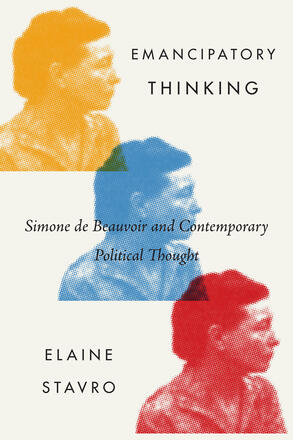
Emancipatory Thinking
Simone de Beauvoir and Contemporary Political Thought
A sustained defence of the political importance and ongoing relevance of the ideas of the French writer, feminist, and philosopher.
Description
Most scholars have focused on The Second Sex and Simone de Beauvoir’s fiction, concentrating on gender issues but ignoring her broader emancipatory vision. Though Beauvoir’s political thinking is not as closely studied as her feminist works, it underpinned her activism and helped her navigate the dilemmas raised by revolutionary thought in the postwar period. In Emancipatory Thinking Elaine Stavro brings together Beauvoir’s philosophy and her political interventions to produce complex ideas on emancipation. Drawing from a range of work, including novels, essays, autobiographical writings, and philosophic texts, Stavro explains that for Beauvoir freedom is a movement that requires both personal and collective transformation. Freedom is not guaranteed by world historical systems, material structures, wilful action, or discursive practices, but requires engaged subjects who are able to take creative risks as well as synchronize with existing forces to work towards collective change. Beauvoir, Stavro asserts, resisted the trend of anti-humanism that has dominated French thinking since the 1960s and also managed to avoid the pitfalls of voluntarism and individualism. In fact, Stavro argues, Beauvoir appreciated the impact of material, socio-economic, institutional forces, without forgoing the capacity to initiate. Applying Beauvoir’s existential insights and understanding of embodied and situated subjectivity to recent debates within gender, literary, sociological, cultural, and political studies, Emancipatory Thinking provides a lens to explore the current political and theoretical landscape.
Reviews
"Emancipatory Thinking presents an excellent and sustained argument for the recovery of the work of Simone de Beauvoir as an activist in her own right. It does not reduce Beauvoir to existentialism, but rather embeds her work in a larger discussion in which existentialism itself was embedded. The result is a revelatory, impressive, and compelling interpretation of Beauvoir." Judith Grant, Ohio University
"Occupying the intersections of political and philosophical writings, lived experience and theoretical reflection, and the political moment of Beauvoir's day with the emergent political crisis and contentions of our own, Stavro expands the conversation with Beauvoir to include both scholars and concerned citizens." University of Toronto Quarterly
"Stavro's book is steeped in the language and tradition of poststructuralist and feminist discourse, so some advanced training is necessary to appreciate her points ... the ... reader will uncover a novel and integrating approach to examining Beauvoir's complete literary corpus. Recommended." Choice
"Stavro’s focus on the concrete political and social realities to which Beauvoir responds in her work sheds light on her writings as well as her activism.” Hypatia